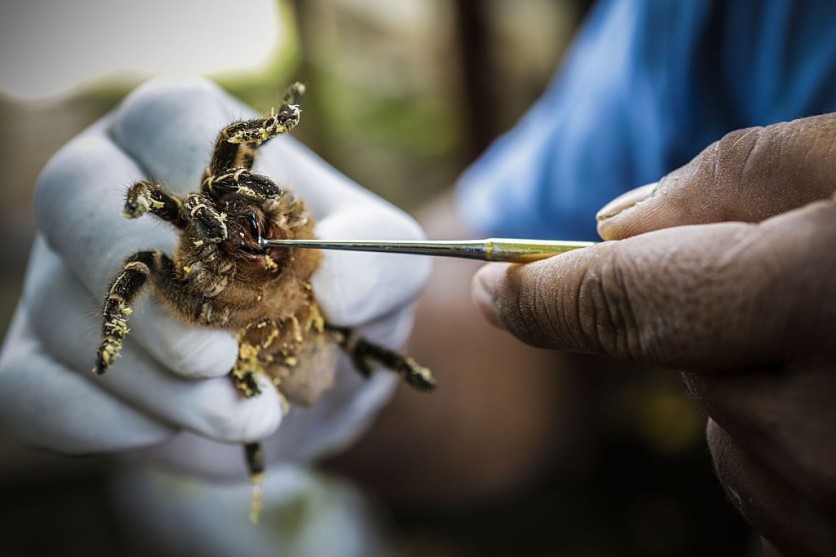Recent research unveils the potential role of spider venom in addressing heart attacks and strokes. An examination of a specific spider venom molecule indicates its potential to protect the heart during these critical events.

TO GO WITH AFP STORY by Blanca Morel An employee shows the chelicerae and fangs.
Game-Changer in Cardiovascular Treatment
A group of scientists from the Institute for Molecular Bioscience (IMB) has advanced the prospect of a groundbreaking treatment for heart attacks and strokes, leveraging a molecule discovered in the venom of the K'gari funnel web spider.
Led by Associate Professor Nathan Palpant and Professor Glenn King, the research duo had previously showcased the potential of the drug candidate Hi1a in protecting cells from the damaging consequences of heart attacks and strokes.
Interesting Engineering reported that the most recent study has elevated the prominence of this venom-derived solution by successfully meeting crucial milestones in preclinical tests, providing a ray of hope for individuals contending with cardiovascular diseases.
Dr. Palpant highlights recent progress, explaining that the tests conducted represent a significant step forward in understanding Hi1a's therapeutic potential. This involves determining the optimal stage of a heart attack for its application and establishing the appropriate dosage.
What makes Hi1a stand out is its effectiveness in protecting the heart, comparable to a cardioprotective drug that advanced to Phase 3 clinical trials but was ultimately abandoned due to side effects.
Notably, Hi1a exhibits a unique characteristic, selectively interacting with cells in the injured area of the heart during an attack. This specificity avoids contact with healthy regions, minimizing the risk of side effects.
Seeing Hi1a's Potential
Professor King, known for developing the world's first insecticides derived from spider venom, uncovered Hi1a in the venom of the K'gari funnel web spider. Hi1a has the potential to mitigate heart and brain damage during heart attacks and strokes by preventing cell death induced by oxygen deprivation.
Independent safety studies conducted by contract research organizations have affirmed Hi1a's efficacy and safety as a therapeutic. This groundbreaking research laid the foundation for Infensa Bioscience, a company co-founded by the researchers.
In 2022, the company successfully raised $23 million to advance the commercial development of Hi1a. Infensa CEO and UQ researcher Associate Professor Mark Smythe underscores the global significance of this breakthrough in its official press release.
He stated that while heart attacks and strokes are major contributors to cardiovascular disease-related deaths, there are currently no drugs on the market designed to prevent the damage they inflict.
Global cardiovascular disease statistics underscore the critical need for innovative solutions, as it remains the leading cause of death. Dr. Smythe envisions Hi1a as a transformative therapeutic, presenting a breakthrough with the potential to positively impact millions worldwide.
Also Read : How to Cure Arthritis? This SCORPION Venom Might be the Key to Eliminating Side Effects!
Collaborative Effort
As reported by News Medical, the research team, comprising Dr. Meredith Redd from IMB, Dr. Melissa Reichelt, and Dr. Yusuke Yoshikawa from UQ's School of Biomedical Sciences, has received support from various entities.
These include the Australian National Health and Medical Research Council, Australian Medical Research Future Fund, The University of Queensland, Infensa Bioscience, The Heart Foundation, and The Lott by Golden Casket.
Related Article : New Research Shows Bacteria in Snake & Spider Venom Mutates, Human Victims Must be Treated for Infections Too

ⓒ 2025 TECHTIMES.com All rights reserved. Do not reproduce without permission.




